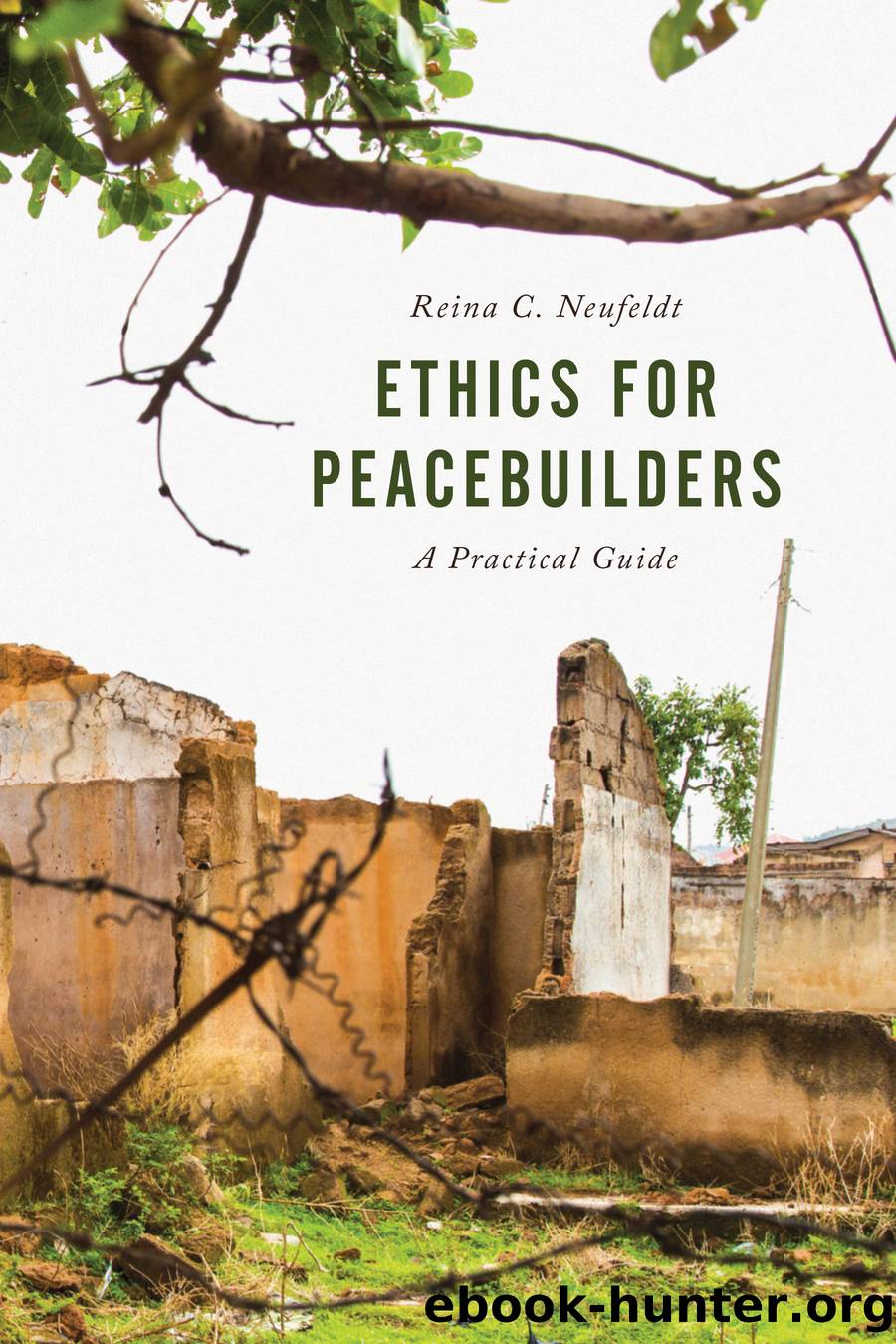Ethics for Peacebuilders by Neufeldt Reina C.;

Author:Neufeldt, Reina C.; [Neufeldt, Reina C.]
Language: eng
Format: epub
Publisher: Rowman & Littlefield Publishers, Incorporated
Published: 2016-08-15T00:00:00+00:00
Textbox 4.4. Duties: Key Questions
What are the moral obligations and responsibilities that are required of everyone (universal)? Am I (are we) following our moral obligations?
Am I (are we) treating people as ends in and of themselves or as means to an end? Are we treating everyone as having equal moral claims (rights)?
Are these moral obligations reasonable? (Would rational individuals under conditions of liberty and equity consent?)
Duties applied. To apply duty-based analysis to the moral challenge of whether or not to share a detailed conflict analysis publicly and with security forces in Jos shifts our understanding of what matters from the preceding consequentialist application. A duty-based perspective focuses us on the right thing to do because of its intrinsic good regardless of consequences. Of central concern is the value of people, and to ensure that people are always treated as ends and never as a means to an end. For the organization, to apply the categorical imperative they have to treat all those who engaged in the conflict analysis (as well as the community) as ends in and of themselves, and not just sources to produce a thorough analysis or some overall calculation of good for everyone. The organization therefore needs to act in ways that ensure stakeholders and other community members are not used as means. For example, the organization might decide to ask people who participated in the conflict analysis if they consent to the information being shared publicly through a careful and rational deliberative process. If participants whose lives may be at risk because of information shared in the conflict analysis say no, then the organization is obliged to not share it. The organization may also recognize their duty to protect community members from harm (which they reason is something people under conditions of freedom and equity would agree with), and decide not to share the conflict analysis even without conferring with stakeholders. These obligations sound reasonable as it does not impose undue duress on the organization or people within it or outside of it. The decision might therefore be made to not share the conflict analysis from a duty-based perspective to fully respect obligations to stakeholders. The organization might choose to engage on conflict issues some other way to also respond to other persons in the community, but protect the information gathered from their conflict analysis.
Download
This site does not store any files on its server. We only index and link to content provided by other sites. Please contact the content providers to delete copyright contents if any and email us, we'll remove relevant links or contents immediately.
The Secret History by Donna Tartt(19089)
The Social Justice Warrior Handbook by Lisa De Pasquale(12190)
Thirteen Reasons Why by Jay Asher(8910)
This Is How You Lose Her by Junot Diaz(6887)
Weapons of Math Destruction by Cathy O'Neil(6280)
Zero to One by Peter Thiel(5802)
Beartown by Fredrik Backman(5754)
The Myth of the Strong Leader by Archie Brown(5508)
The Fire Next Time by James Baldwin(5446)
How Democracies Die by Steven Levitsky & Daniel Ziblatt(5219)
Promise Me, Dad by Joe Biden(5153)
Stone's Rules by Roger Stone(5088)
A Higher Loyalty: Truth, Lies, and Leadership by James Comey(4964)
100 Deadly Skills by Clint Emerson(4925)
Rise and Kill First by Ronen Bergman(4789)
Secrecy World by Jake Bernstein(4753)
The David Icke Guide to the Global Conspiracy (and how to end it) by David Icke(4720)
The Farm by Tom Rob Smith(4513)
The Doomsday Machine by Daniel Ellsberg(4490)
